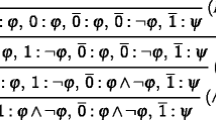Abstract
Crispin Wright in his 1982 paper argues for strict finitism, a constructive standpoint that is more restrictive than intuitionism. In its appendix, he proposes models of strict finitistic arithmetic. They are tree-like structures, formed in his strict finitistic metatheory, of equations between numerals on which concrete arithmetical sentences are evaluated. As a first step towards classical formalisation of strict finitism, we propose their counterparts in the classical metatheory with one additional assumption, and then extract the propositional part of ‘strict finitistic logic’ from it and investigate. We will provide a sound and complete pair of a Kripke-style semantics and a sequent calculus, and compare with other logics. The logic lacks the law of excluded middle and Modus Ponens and is weaker than classical logic, but stronger than any proper intermediate logics in terms of theoremhood. In fact, all the other well-known classical theorems are found to be theorems. Finally, we will make an observation that models of this semantics can be seen as nodes of an intuitionistic model.
Article PDF
Similar content being viewed by others
Avoid common mistakes on your manuscript.
References
Dean, W. (2018). Strict finitism, feasibility, and the sorites. The Review of Symbolic Logic, 11(2), 295–346. https://doi.org/10.1017/s1755020318000163.
Dummett, M. (1975). Wang’s paradox. In Truth and other enigmas. chap 15, published in 1978 (pp. 248–68). Cambridge: Harvard University Press.
Lifschitz, V., Pearce, D., & Valverde, A. (2001). Strongly equivalent logic programs. ACM Transactions on Computational Logic, 2(40), 526–41. https://doi.org/10.1145/383779.383783.
Magidor, O. (2012). Strict finitism and the happy sorites. Journal of Philosophical Logic, 41(2), 471–91. https://doi.org/10.1007/s10992-011-9180-8.
Murzi, J. (2010). Knowability and bivalence: Intuitionistic solutions to the paradox of knowability. Philosophical Studies, 149, 269–81. https://doi.org/10.1007/s11098-009-9349-y.
Tennant, N. (1997). The Taiming of the true. Oxford: Clarendon Press.
Wright, C. (1982). Strict finitism. In Realism, meaning and truth. chap 4, 2nd edition in 1993 (pp. 107–75). Oxford U.K.; Cambridge U.S.A.: Blackwell Publishers.
Yessenin-Volpin, A.S. (1970). The ultra-intuitionistic criticism and the antitraditional program for foundations of mathematics. In A. Kino, J. Myhill, & R. Vesley (Eds.) Intuitionism and proof theory (pp. 3–45). Amsterdam, London, Buffalo N.Y.: North-Holland Publishing Company, https://doi.org/10.1016/s0049-237x(08)70738-9.
Acknowledgements
I would like to thank Rosalie Iemhoff for her everyday, most insightful and helpful pieces of advice. I am also grateful to Amirhossein Akbar Tabatabai for his penetrating comments: indeed, it was he who first suggested the relation with IPC. I sincerely thank an anonymous referee for extremely helpful comments and suggestions. Some of the rudimentary versions of the present article were presented at the OZSW Conference 2020, the 3rd Workshop on Proof Theory and its Applications in 2021 and the Dutch Logic PhD Day 2022. This study was conducted under the doctoral supervision by Professor Rosalie Iemhoff at Utrecht University.
Funding
This study was funded under the name of ‘Graduate Scholarship for Degree Seeking Students’ by Japan Student Services Organisation.
Author information
Authors and Affiliations
Corresponding author
Additional information
Publisher’s Note
Springer Nature remains neutral with regard to jurisdictional claims in published maps and institutional affiliations.
Rights and permissions
Open Access This article is licensed under a Creative Commons Attribution 4.0 International License, which permits use, sharing, adaptation, distribution and reproduction in any medium or format, as long as you give appropriate credit to the original author(s) and the source, provide a link to the Creative Commons licence, and indicate if changes were made. The images or other third party material in this article are included in the article's Creative Commons licence, unless indicated otherwise in a credit line to the material. If material is not included in the article's Creative Commons licence and your intended use is not permitted by statutory regulation or exceeds the permitted use, you will need to obtain permission directly from the copyright holder. To view a copy of this licence, visit http://creativecommons.org/licenses/by/4.0/.
About this article
Cite this article
Yamada, T. Wright’s Strict Finitistic Logic in the Classical Metatheory: The Propositional Case. J Philos Logic 52, 1081–1100 (2023). https://doi.org/10.1007/s10992-022-09698-w
Received:
Accepted:
Published:
Issue Date:
DOI: https://doi.org/10.1007/s10992-022-09698-w



